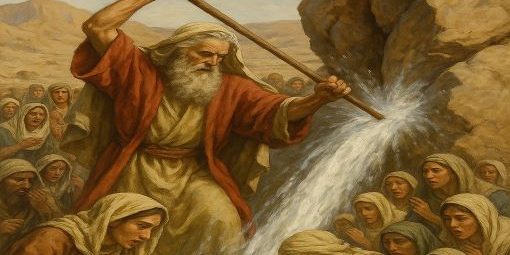From The Rabbi’s Study…Shabbat, July 4, 5, 2025/8, 9 Tammuz 5785
Happy Independence Day #250! Let us give Honor and Respect to our Military and Veterans who fought for our freedoms!
No Shabbat Services this Friday night.
The Torah summary continues with the law of the red heifer, the death of Miriam, the sin of Moses and Aaron and its punishment, the king of Edom refuses the children of Israel permission to pass through his land, the death of Aaron, rebellion, the resulting plague and its cure, and the war with the Canaanites and defeat of Og, king of Bashan.
Judaism concepts and values: The red heifer and the punishment of Moses and Aaron.
One of the mitzvot in this Torah portion is the ritual uncleanliness of the dead.
Most people know Moses as the great leader of the Israelites who lived in the land of Egypt under slavery of the Pharaoh, Ramses II. Some do not know why he was not allowed to enter the Promised Land.
From the uncertainty of the unknown, the constant complaining of the people to Moses and Aaron of the lack of food, and then water, was a lot to handle. When Miriam was alive there was water to be found, and then Miriam dies. So, Moses raises his hand and strikes the rock twice with his rod. Water comes forth from the rock allowing everyone to drink. Moses is then told that because he did not trust in G-d, he will not lead the congregation of Israel into the Promised Land. Several rabbinic commentators point out that Moses and Aaron were guilty of arrogance. Their instruction from G-d was to speak to the rock. Instead, Moses publicly strikes the rock twice, implying that he lacked faith in G-d.
Maimonides claims that G-d punished Moses because of his exasperation with the complaints and quarreling of the Israelites (Shemonah Perakim 4).
In the Torah, when one finds a repetition of a passage, it has great importance and requires one to really examine within the lines. In the Torah (Numbers 20:8) and then (Numbers 10-11) have a slightly different meaning. When we read both they appear similar, except for “Listen, you rebels!” (Numbers 20:10). Moses is calling the people “rebels”, but not truly rebels like the previous group (Korach). A midrash connects the Greek word for fools and also the Hebrew word for teacher (Morim). It renders it “Hear now, ye who presume to teach your teachers”; i.e. ye who imagine yourselves to be wiser than your leaders! “This impatience with the people was considered reprehensible in Divinely appointed leaders’” (Maimonides). In essence, Moses should have had tolerance, but more importantly, he did not follow G-d’s instructions.
May we continue to see peace in Israel. May we hear that Hamas in Gaza released all our hostages to return to their loved ones.
May we continue to pray that the Jewish people throughout the world have health and safety along with their freedoms.
Shabbat Shalom V’ Am Ysrael Chai,
Rabbi Helene Ainbinder







